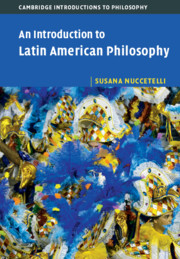Book contents
- An Introduction to Latin American Philosophy
- An Introduction to Latin American Philosophy
- Copyright page
- Dedication
- Contents
- Tables
- Preface
- 1 Setting the Scene: The Iberian Conquest
- 2 Modest and Immodest Feminism
- 3 The Authoritarian Republicanism of Bolívar
- 4 The Liberal Republicanism of Sarmiento and Alberdi
- 5 Homegrown and Imported Positivism
- 6 Martí’s Liberal Anti-Positivism
- 7 Utopian Latin Americanism: Arielism and Mestizofilia
- 8 Soft and Hard Socialism
- 9 Liberation Theology and Philosophy
- 10 Skepticism and Anti-Skepticism About Latin American Philosophy
- Glossary
- Bibliography
- Index of Names and Subjects
- References
6 - Martí’s Liberal Anti-Positivism
Published online by Cambridge University Press: 15 October 2020
- An Introduction to Latin American Philosophy
- An Introduction to Latin American Philosophy
- Copyright page
- Dedication
- Contents
- Tables
- Preface
- 1 Setting the Scene: The Iberian Conquest
- 2 Modest and Immodest Feminism
- 3 The Authoritarian Republicanism of Bolívar
- 4 The Liberal Republicanism of Sarmiento and Alberdi
- 5 Homegrown and Imported Positivism
- 6 Martí’s Liberal Anti-Positivism
- 7 Utopian Latin Americanism: Arielism and Mestizofilia
- 8 Soft and Hard Socialism
- 9 Liberation Theology and Philosophy
- 10 Skepticism and Anti-Skepticism About Latin American Philosophy
- Glossary
- Bibliography
- Index of Names and Subjects
- References
Summary
Chapter 6 looks closely at the work of José Martí (Cuban, 1853-1895) who was among the first in Latin America to react against positivism. This chapter argues that Martí’s doctrines must be understood in the context of his endorsement of Hispano-Krausism, a philosophical outlook fashionable in academic circles in Spain at the time Martí was exiled there. Armed with a Krausist theoretical framework, Martí argued for a mestizaje view of racial and ethnic identity in Latin America, defended the unity and sovereignty of the region, especially in light of the rising threat of US imperialism, and advocated for the freedom of his beloved country, Cuba, from Spanish colonialism. On the proposed interpretation, appeals to a Marxist Martí are unhelpful to understanding his actual claims concerning race, Latin American unity, and an individual’s happiness – which for him requires not only material well-being but also harmony with other individuals and nature.
Keywords
- Type
- Chapter
- Information
- An Introduction to Latin American Philosophy , pp. 131 - 151Publisher: Cambridge University PressPrint publication year: 2020

